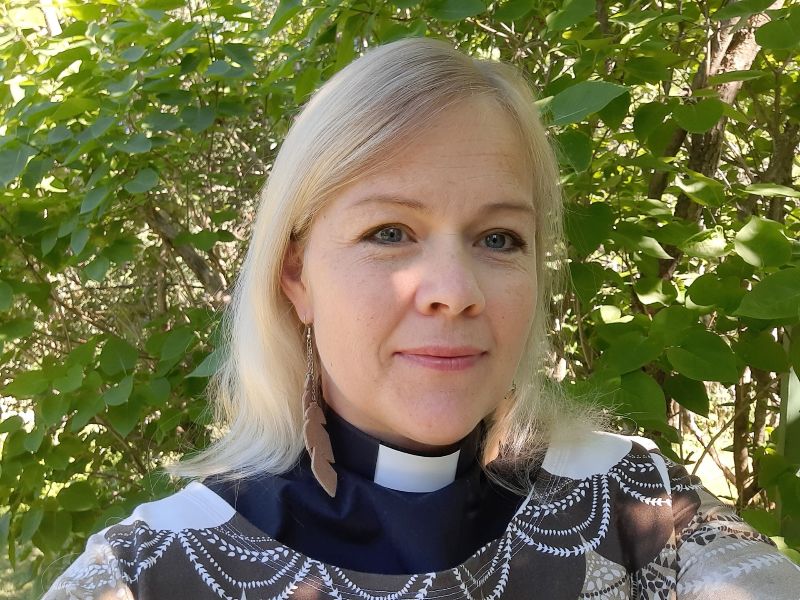Hospital chaplein
"The profession of a hospital chaplain requires mental strength and willingness to engage in multiprofessional cooperation. Good self-knowledge and the ability to set boundaries between work and free time lay the foundation for coping at this work. You must know how take care of your own well-being. Putting people’s experiences and situations into words is also an important skill."

- Maija Haaparanta
- Hospital chaplain at the Mikkeli Lutheran Parish.
- Graduated as a master of theology from the University of Helsinki and completed the Church Council of Finland’s special training in hospital pastoral care and defusing facilitator training. Currently in doctoral education at the University of Eastern Finland.
- 18 years of work experience in the field.
Briefly explain what you do for a living.
I’m a hospital chaplain by trade. It’s my duty to listen to and support people in various crises and in the vicinity of death. I’m available for patients, their family and staff. If necessary, I organise defusing meetings for the staff. Defusing means that the staff can defuse a mentally stressful situation within a few hours of the event.
How have you ended up in the profession of your choice?
I had two role models when I was young: a teacher of mine in general upper secondary school and a priest who worked with parish youths. Through them, my spark for religious work was ignited for the first time. After general upper secondary school, applying to a faculty of theology was an excellent choice, as the subjects most interesting for me—religion, philosophy and psychology—were combined in the course selection.
I was to become a teacher, but I had bad luck with the entrance exams for pedagogical studies. The first time I got sick, and the second time my application papers got lost in the mail. I thought that was providence. I’m supposed to become a priest.
You cannot seek training in hospital pastoral care and the profession of hospital chaplain directly after your studies. I applied for the training for the first time at the age of 26. I was told that it would be best for me to grow for a few more years. Hospital chaplains mainly deal with suffering and grief, so age and life experience help you cope at work. A few years passed, I had three children and I had another chance to apply for the training. This time I was selected. The work is meaningful because I have a strong belief that people can survive the most terrible and heaviest of trials.
Describe your typical working day or week.
If I check what the next work week looks like from the calendar on Friday, it’s often quite empty. There are a few scheduled meetings. When it hits 8 o’clock on Monday, my phone starts to ring and my calendar fills up. After that, there is no time to twiddle your thumbs. Most of my time goes to listening to people, that is, pastoral care in their home or at a hospital. There’s usually a very little time for preparation before the meetings.
What kind of work environment or working hours do you have?
My work environment consists of a hospital and people’s homes. I have no specified working hours, and I work in an on-call basis. Most of my work days are 8:00–16:00, but the time doesn’t matter when dealing with crises and death. I’m available until 21:00 every day.
What kind of competence or qualities are required in the profession?
The profession of a hospital chaplain requires mental strength and willingness to engage in multiprofessional cooperation. Good self-knowledge and the ability to set boundaries between work and free time lay the foundation for coping at this work. You must know how take care of your own well-being. Putting people’s experiences and situations into words is also an important skill. The work is client-oriented, that is, always respectful of the client’s belief, and my faith is not at the centre of the client work.
What is the best thing about your profession?
Getting to work with people.
What are the downsides of the profession or what seems challenging?
Devices and systems that don’t work. Sometimes there’s only a few minutes of time to print a paper, and if I can’t do it, I get stressed.
What would you tell a person considering the profession of a hospital chaplein?
I recommend that you learn about the work of a hospital chaplain, if possible. It should also be noted that you can only apply for special training in hospital pastoral care when you are a priest.
How do you see the future of your profession?
The future looks twofold. What is positive is that research shows that our profession is appreciated by the millennial generation. It’s the church’s duty to be present when a person encounters suffering. What would be more necessary place than a hospital?
Studies also show that hospital chaplains are less appreciated within the parish than in health care. We are a small profession, as there are about 100 hospital chaplains in Finland. If our appreciation within the church falls, it will be easy to cut these positions as the economic situation declines.
